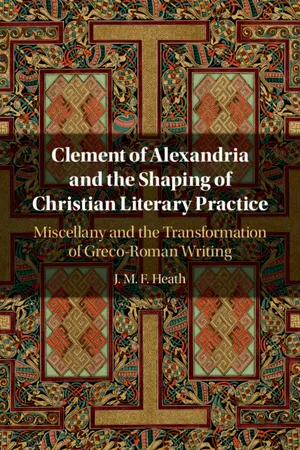
Clement of Alexandria and the Shaping of Christian Literary Practice
Miscellany and the Transformation of Greco-Roman Writing
- English
- PDF
- Available on iOS & Android
Clement of Alexandria and the Shaping of Christian Literary Practice
Miscellany and the Transformation of Greco-Roman Writing
About This Book
Clement of Alexandria's Stromateis were celebrated in antiquity but modern readers have often skirted them as a messy jumble of notes. When scholarship on Greco-Roman miscellanies took off in the 1990s, Clement was left out as 'different' because he was Christian. This book interrogates the notion of Clement's 'Christian difference' by comparing his work with classic Roman miscellanies, especially those by Plutarch, Pliny, Gellius, and Athenaeus. The comparison opens up fuller insight into the literary and theological character of Clement's own oeuvre. Clement's Stromateis are contextualised within his larger literary project in Christian formation, which began with the Protrepticus and the Paedagogus and was completed by the Hypotyposeis. Together, this stepped sequence of works structured readers' reorientation, purification, and deepening prayerful 'converse' with God. Clement shaped his miscellanies as an instrument for encountering the hidden God in a hidden way, while marvelling at the variegated beauty of divine work refracted through the variegated beauty of his own textuality.
Frequently asked questions
Information
Table of contents
- Cover
- Half-title
- Title page
- Copyright information
- Contents
- Acknowledgements
- 1 Introduction: A Christian among Roman Miscellanists
- 2 Clement's Miscellanism and the Scholarly Trope of Christian Difference
- 3 Studying Ancient Miscellanism: Defining Features, Scope and Method
- 4 Early Imperial Cultures of Miscellany-Making: Clement's Social and Institutional Contexts
- 5 Self-Introductions and Clement's Miscellanistic Vocation
- 6 Miscellany Titles and Clement's Divine Paratexts
- 7 The Miscellanist's Trope of Deselecting Titles and Clement's Conversion of Imagery
- 8 Muses in the Miscellanists' Frame
- 9 Clement's Theology of Hiddenness and the Logic of Christian Miscellanism
- 10 Mystery Initiation and Clement's Literary Paideia: The Making of a Christian Miscellanist
- 11 Poikilia: Theological Interpretation of a Miscellanistic Aesthetic
- 12 Conclusion
- Appendix The Literary Sequence of Protrepticus, Paedagogus, Stromateis (and Hypotyposeis)
- Bibliography
- Index